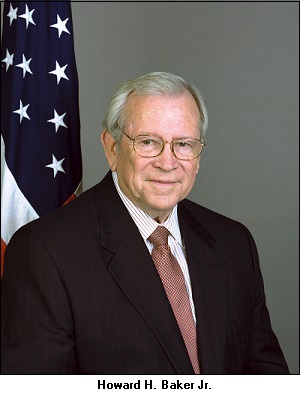
|
|

|
|
| April 26, 2024 |
|
Sen. Howard Baker, majority leader and Reagan’s chief of staff, dies at 88 
Former senator Howard H. Baker Jr. of Tennessee, who framed the central question of the Watergate scandal when he asked “what did the president know and when did he know it?” and framed portraits of history with his ever-present camera while Senate majority leader and White House chief of staff, died June 26 at his home in Huntsville, Tenn. He was 88.
The cause was complications from a stroke, said longtime aide Tom Griscom. Mr. Baker, who played a central role across two decades of Republican politics, wryly noted that photography “may be the only place where I can reasonably aspire to perfection.” In the Senate, he served as a bridge between decades of bipartisan comity and the acrimony that has prevailed since the 1980s. At the White House, he was the ballast of sound ethics that helped steady Ronald Reagan’s foundering presidency after the Iran-Contra scandal came to light. The talent for compromise that propelled him to the leadership of the Senate was the undoing of his ultimate ambition, his own presidency, as his party shifted rightward and demanded strict adherence to conservative orthodoxy from its candidates for the White House. His tenure as majority leader coincided with Reagan's first term, from 1981 to 1985, and Reagan said the White House program of tax cuts, which Mr. Baker skeptically called “a riverboat gamble,” would not have been enacted without him. He was, said former Secretary of State James A. Baker III, to whom he was not related, “the quintessential mediator, negotiator and moderator.” Mr. Baker, who served in the Senate from 1967 to 1985, was a politician as much by Republican pedigree and marriage as by election. His father served as a member of the House of Representatives from Tennessee. His father-in-law was Everett McKinley Dirksen, an Illinois Republican and Senate minority leader. Three years after his first wife, the former Joy Dirksen, died of cancer in 1993, Mr. Baker married Nancy Landon Kassebaum, who was about to retire from the Senate after three terms representing Kansas. Her father was Alfred M. Landon, the former governor of Kansas who, as the Republican presidential nominee in 1936, suffered one of the largest electoral defeats of all time. Mr. Baker was the first popularly elected Republican senator from Tennessee, cultivating a moderate image despite an often conservative voting record. He shuffled about, rumpled and snapping away with his Leica whether in Senate committee meetings or the White House Cabinet Room. When he was named vice chairman of the Senate Select Committee on Presidential Campaign Activities, the Senate Watergate Committee formed to investigate the 1972 break-in at Democratic National Committee headquarters in the Watergate office building, Republicans were confident that the second-term southerner and trial lawyer with the boyish look and aw-shucks manner would defend the White House. His 1972 campaign literature described him as a “close friend and trusted advisor of our President, Richard M. Nixon.” Indeed, when he asked the question for which he became famous, Mr. Baker intended to distance Nixon from the scandal. But what the president knew and when he knew it became the focus of the investigation of the seven-member panel during the summer of 1973 and of the Watergate special prosecutor, and led to Nixon's resignation a year later. “The fact he acted as impartially as he did is one of the high points of his career,” said Rutgers University political scientist Ross Baker, who is not related to the former senator, speaking of the senator’s conduct on the panel. Mr. Baker said 25 years after Nixon’s resignation that during the televised hearings, he was so “tightly focused on trying to find out what really happened” that he was unable to understand the ultimate meaning of the break-in, the cover-up, the investigation and the resignation. “It was, indeed, a watershed time in American politics. And I guess I have to look back on it to realize how effective the system really was . . . the system worked,” he said on the PBS public affairs show “The NewsHour With Jim Lehrer.” The Reagan White House As much as he played a key role in the unwinding of the Nixon presidency, Mr. Baker was a bulwark in the final years of the Reagan White House. Reagan was reeling from the Iran-Contra scandal, in which missiles were sold to Iran in violation of a congressional embargo and some of the proceeds were diverted to support the insurgent Contras seeking to overthrow Nicaragua’s leftist government. The president turned to Mr. Baker in February 1987. Retired two years from the Senate and making a handsome living as a private lawyer, $1.5 million a year with the Vinson & Elkins firm, by one account, he returned to government as White House chief of staff, recognizing he was ending any chance to run for president in 1988. (Source: the Washington Post) Story Date: June 27, 2014
|